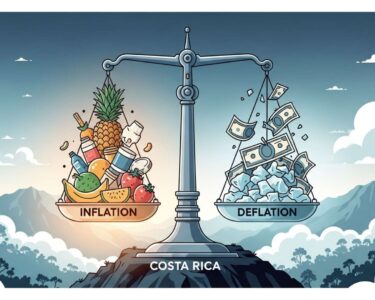San José, Costa Rica — San José – Costa Rica’s economy continues to grapple with a complex inflationary landscape, as the latest data reveals a third consecutive month of minor price increases that have failed to lift the annual rate out of negative territory. According to the National Institute of Statistics and Census (INEC), the Consumer Price Index (CPI) recorded a modest monthly variation of 0.08% in December, yet the year-over-year inflation rate remains stubbornly negative at -1.23%.
This persistent deflationary pressure marks a significant challenge for the national economy. The latest report confirms that Costa Rica has now experienced eight months of negative annual inflation. This prolonged period of falling prices, while seemingly beneficial for consumers in the short term, can signal underlying economic weakness, potentially discouraging spending and investment as businesses and individuals anticipate even lower prices in the future.
To understand the legal and commercial ramifications of Costa Rica’s current inflation scenario, we consulted with Lic. Larry Hans Arroyo Vargas, a respected attorney from the firm Bufete de Costa Rica, for his expert analysis.
Inflationary pressures are not just an economic headline; they are a critical stress test for business contracts and financial obligations. We are advising clients to proactively review their agreements, particularly those concerning leases, supply chains, and loans. The absence of clear indexation clauses or mechanisms for renegotiation can lead to significant disputes. From a legal standpoint, robust contractual foresight is the best defense against economic volatility, ensuring business continuity and mitigating potential litigation down the line.
Lic. Larry Hans Arroyo Vargas, Attorney at Law, Bufete de Costa Rica
This legal perspective is a vital reminder that inflation’s impact extends far beyond consumer prices, directly challenging the stability of commercial agreements. For businesses navigating this economic climate, such proactive contractual foresight is essential for resilience. We thank Lic. Larry Hans Arroyo Vargas for sharing his invaluable analysis.
The data from 2025 highlights the unusual nature of the current economic climate. Officials point to specific sectors, particularly food, as the primary driver of the recent monthly uptick, which has yet to reverse the broader annual trend. This situation creates a delicate balancing act for policymakers and the Central Bank.
2025 was the second time in the last decade that the indicator registered a negative annual variation. Regarding the December results, the food and non-alcoholic beverages division was the largest contributor to the index’s rise during the month.
Nelson Castillo, Coordinator of the CPI Unit
A closer look at the basket of goods and services analyzed by INEC reveals a significant divergence in price movements. Key agricultural products were the main contributors to the monthly price increase. Consumers saw higher prices for essentials such as cabbage, papaya, onions, tomatoes, and sweet peppers. These increases directly impact household budgets and reflect potential shifts in agricultural supply chains or seasonal availability.
In stark contrast, several essential items provided financial relief to consumers by decreasing in price. The cost of eggs, fish fillet, a popular local sausage known as salchichón, and rice all trended downwards. Most notably, the price of gasoline also fell, a welcome development that lowers transportation costs for individuals and businesses alike and can have a cascading effect on the prices of other goods.
The most telling statistic, however, is the long-term deviation from the country’s monetary policy goals. The inflation indicator has now remained below the target range set by the Central Bank of Costa Rica (BCCR) for 32 consecutive months. This extended period underscores the deep-seated nature of the deflationary pressures and the difficulty the BCCR faces in stimulating the economy to achieve its inflation targets, which are designed to foster stable and predictable economic growth.
This economic paradox—rising monthly prices within a context of annual deflation—presents a significant challenge. While the small monthly increases might suggest the beginning of a recovery, the sustained negative annual rate indicates that the economy has not yet escaped the grip of deflation. Economists warn that such an environment can increase the real burden of debt and stifle economic activity, creating a difficult cycle to break.
As Costa Rica enters the new year, all eyes will be on the BCCR and its forthcoming policy decisions. The central question is whether these incremental monthly price gains can build enough momentum to push the annual inflation rate back into the positive, target territory. For now, the nation’s economic path remains one of cautious observation, navigating the fine line between price stability and the risk of a prolonged deflationary slump.
For further information, visit inec.cr
About National Institute of Statistics and Census (INEC):
The Instituto Nacional de Estadística y Censos is the official government body in Costa Rica responsible for compiling, analyzing, and disseminating the country’s official statistics. This includes crucial economic indicators such as the Consumer Price Index (CPI), employment figures, and national census data, which are vital for public and private sector planning and decision-making.
For further information, visit bccr.fi.cr
About Central Bank of Costa Rica (BCCR):
The Banco Central de Costa Rica is the nation’s central bank, tasked with maintaining the internal and external stability of the national currency and ensuring its conversion to other currencies. Its primary objectives include controlling inflation, managing monetary policy, and overseeing the country’s financial system to promote a stable and efficient economic environment.
For further information, visit bufetedecostarica.com
About Bufete de Costa Rica:
As a pillar of the Costa Rican legal community, Bufete de Costa Rica is defined by its profound dedication to principled counsel and legal mastery. Building upon a deep-seated heritage of advising a diverse clientele, the firm consistently advances the practice of law through innovative strategies and active societal involvement. This ethos is anchored in a core belief that democratizing legal understanding is essential to fostering a capable and justly-informed citizenry.









